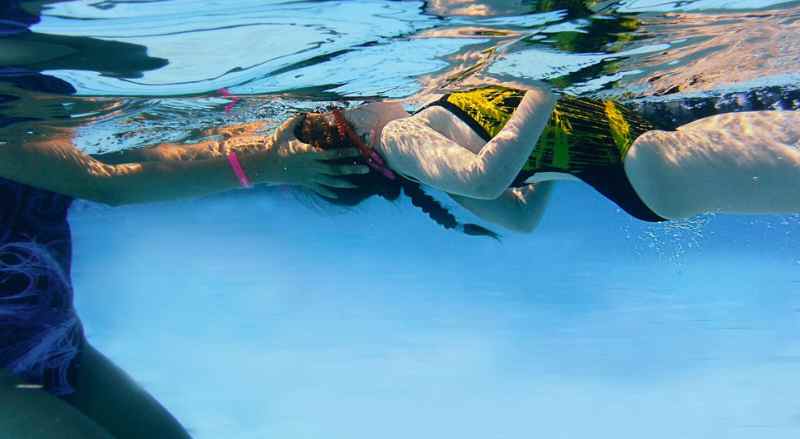The decision to learn how to swim is an important one. So, too, is the decision on how to acquire that skill. Offering swimming instruction to yourself (or your child) is probably one of the best forms of insurance out there!
But now what? Should you take private swimming lessons or learn to swim in a group class?
Which option will you choose? Which method suits you best? Still unsure?
This guide aims to help you evaluate the advantages and disadvantages, and it may also provide new insights or considerations that you hadn’t previously considered.
Let’s explore these factors together.
Swimming is a Lifesaving Skill
Learning to swim is more than just mastering a skill; it’s about equipping oneself with the ability to navigate water safely and potentially save lives.
Imagine a world where everyone has the lifesaving skill of swimming.
Drowning is a leading cause of accidental death worldwide, especially in children.
Swimming lessons play a critical role in preventing drowning incidents and ensuring safety.
This point cannot be emphasized strongly enough.
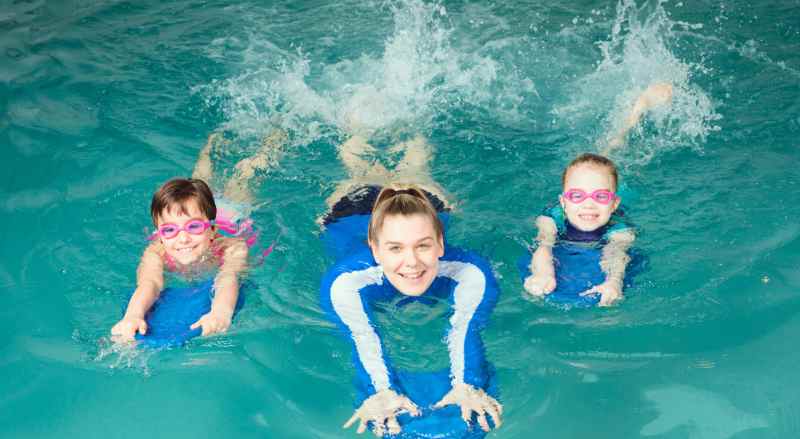
Benefits of Group Swimming Lessons
Group swimming classes can be an enjoyable, supportive, and effective way to learn how to swim.
Learning in a group definitely has some advantages. Here are some just to name a few:
Social Interaction
Joining group lessons is a great way to meet new people, make friends, and connect with others who like the same things as you do.
It’s like being part of a team. Everyone has a shared goal, and everyone works together to be successful.
Observing & Learning
Group swimming lessons allow you to not only learn from your teacher, but also from fellow swimmers in class.
Watching others face similar challenges can provide you with insight into how to apply and adjust your technique. You might also become inspired to try out new strategies that you’ve never considered or weren’t aware of.
Seeing other people around you make progress and achieve success can be a big motivator.
Healthy Competition
Another motivator and advantage of group swimming lessons is the healthy sense of competition they bring.
As you gauge your skills against those of others in your class, you become motivated to improve, and soon enough, each lap swam becomes a personal challenge for you.
Facing friendly challenges can help push you to challenge your limits, paving the way for abundant personal growth.
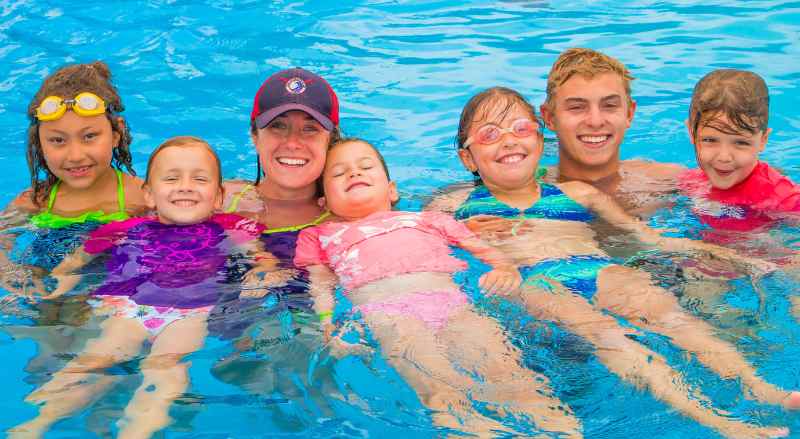
Teamwork
In group swimming lessons, teamwork fosters a sense of belonging and purpose.
Participants not only work on perfecting their strokes but also offer encouragement to one another. Each person contributes their unique skills while learning from others’ insights and techniques.
When your part of a big group, it feels special. You’re all working together towards the same thing.
The Benefits of Private Swim Lessons
Private swimming lessons offer what group lessons cannot: individualized instruction.
Here’s what you can expect if you decide to go this route:
One-on-One Focus
During private lessons, you have the full and undivided attention of your swim teacher, which is not possible to get in group lessons.
Being one-on-one with your teacher allows them to identify both your strengths and weaknesses and customize lessons according to your learning style and capabilities.
Private lessons provide personalized training, which is tailored exclusively to you in order to reach your individual goals.
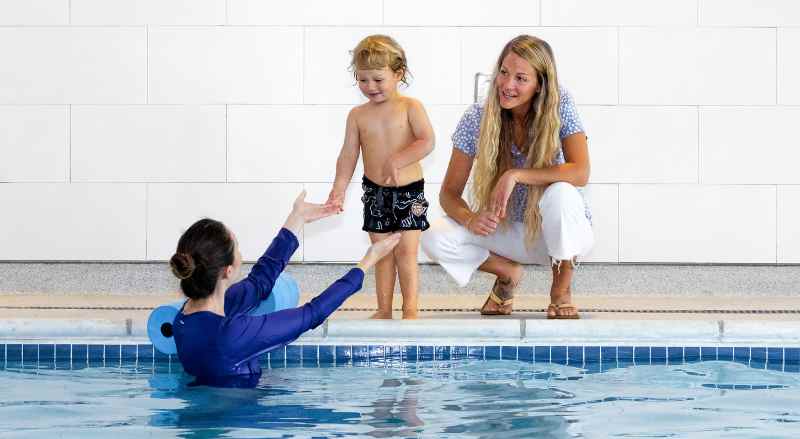
Enhanced Focus
Private lessons could be your solution if you’ve ever felt overwhelmed in a group setting or have difficulty concentrating with all the noise around you.
In a private lesson, you’ll be able to concentrate better and absorb and retain the information you’re given more effectively.
Comfort and Confidence Building
If you’re just starting or if you’re anxious about being in water, opting for private lessons is probably ideal.
It gives you a secure space where you can gradually build your confidence, all at your own pace, without feeling the pressure from those around you.
Focus on Goals
When you take private lessons, your teacher can really focus on understanding your goals and motivations.
The one-on-one time allows them to zoom in and get to know better you better so they are better able to identify your strengths and areas for improvement.
They can give you feedback and helpful advice that will help you improve your performance.
With a little hard work, dedication, and practice you might even find that what you once thought was a weakness could actually become one of your greatest strengths.
Swimming Competitively
With private lessons, your teacher will help you to accelerate, progress, and develop the skills necessary for competitive success.
You’d learn race tactics and mental strategies for racing events, as well as receive invaluable feedback that would enable you to refine your technique and prepare for success.
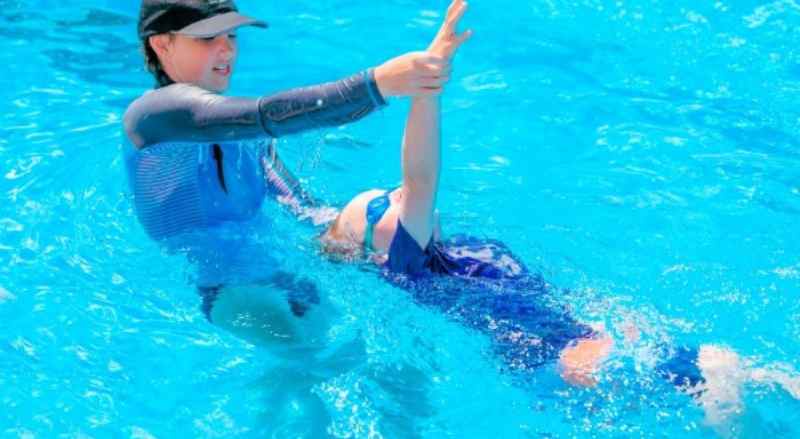
Other Aspects to Consider
Consider Your Schedule
It’s all about finding the right balance for your family’s unique needs and busy schedule.
Private lessons usually provide more flexibility when it comes to sxheduling your class time making it more convenient if you have a busy schedule or other time constraints.
This is a great option compared to being obligated to a fixed time that’s typical with a group swimming class.
The Monetary Aspect
There can be some differences in costs between private and group swim lessons.
Private lessons can be a little pricier due to receiving individual attention and customized teaching, which can speed up your learning.
Group lessons tend to be more cost-effective and still deliver quality instruction yet tend to be less tailored and require adhering to a set schedule.
Making the Right Choice for You
Ultimately, choosing between private and group swimming lessons depends on your needs and preferences.
Group lessons may provide the encouragement necessary for personal success in a social environment.
However, private lessons may provide the ideal experience and one-on-one time with your instructor at times that best suit you.
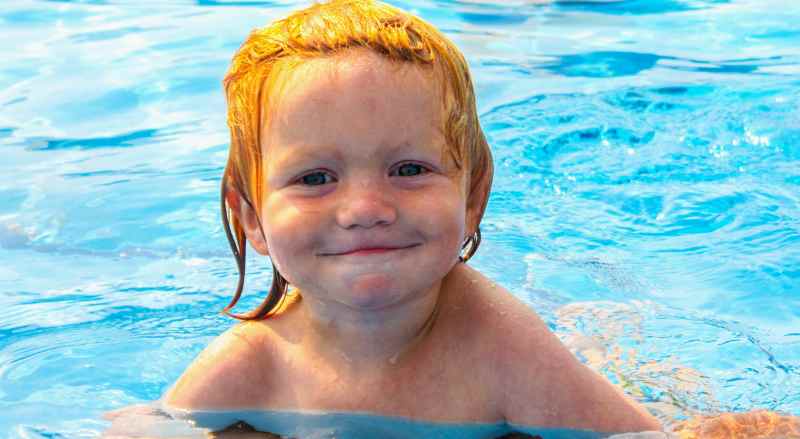
At Njswim, we recognize that every swimmer is unique.
No matter if it is group lessons or private coaching, our aim is always to foster an environment that helps every student to succeed on their swimming journey.
Whichever path you take, rest assured that each decision you make will help you master the art of swimming and help you to build confidence so you can reap all the rewards of being at ease in water.
Jump in and contact us so we can assist in finding you the ideal swimming lesson experience!

